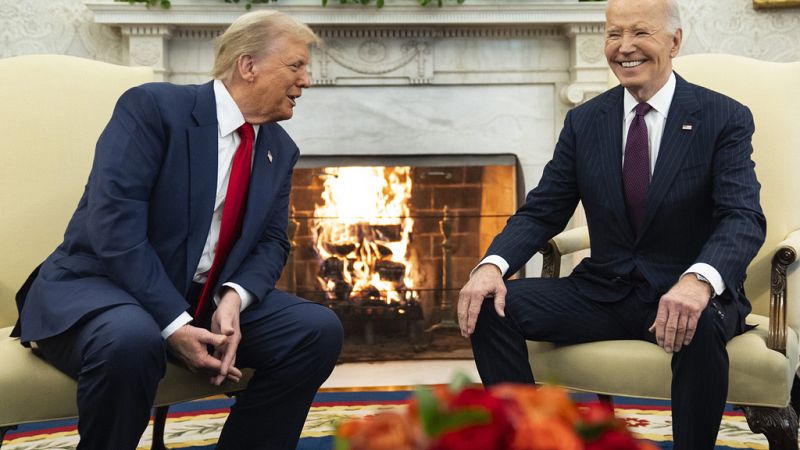US pledges 61% emissions cut by 2035 as Biden bows out

The outgoing Biden administration has committed the US to cutting its greenhouse gas emissions to between 61% and 66% below 2005 levels by 2035, in an updated nationally determined contribution (NDC) submitted to the UN on Thursday.
“The entire 2035 range is on a straight line or steeper trajectory to net zero emissions by 2050 for all greenhouse gases,” it said. Washington also reaffirmed its support for the global agreement at the COP28 climate summit to “transition away from fossil fuels”.
The EU is almost certainly going to miss the February deadline, with Climate Commissioner Wopke Hoekstra having confirmed that the EU executive will not table its already overdue proposal for a 2040 climate target during the first 100 days of the second von der Leyen administration.
There is also considerable doubt as to whether developing countries will submit their pledges in time after last month’s COP29 summit in Baku left them bitterly disappointed with the level of financial support the rich world was prepared to provide for their energy transitions and adapting to climate breakdown.
‘Strong position’
Washington notes in its NDC that the US comfortably surpassed its 17% pledge to 2020, and is in a “strong position” to achieve its target of 50-52% emissions reductions below 2005 levels in 2030 – citing the Biden administration’s Bipartisan Infrastructure Law and Inflation Reduction Act.
The legislation promises hundreds of billions of dollars in public support for clean transport and energy technology and prompted the EU to adopt a Net Zero Industry Act amid fears of falling behind in the global clean tech race – with both Washington and Brussels acutely aware of the risk of China taking the lead.
But America’s trajectory will be hugely dependent on what Trump does during his second go at the US presidency. The sometime property developer and TV celebrity promised on the campaign trail to pull out of the Paris Agreement a second time, and “drill, baby, drill” has been his line on fossil fuels.
During a decades-long fracking boom, the US has become the world’s leading exporter of oil and gas, and output has continued to rise to new record highs on Biden’s watch. For the purposes of the global climate effort, countries are judged only on the oil they burn, not what they sell.
Trump-proofing
In a bid to limit the extent to which Trump might reverse efforts at climate action, the United States Climate Alliance – a nominally bipartisan but essentially Democratic group of state governors set up in 2017 during his first presidency – has published a ‘complementary’ target of a 60% emissions cut by 2035.
The 24 states represented by the governors house 55% of the US population and represent around 60% of its economic output.
“President Biden’s bold leadership is keeping us on a path to achieve a clean energy economy, and together, the country’s climate-leading governors will carry the torch forward,” said US Climate Alliance co-chair New York Governor Kathy Hochul.
New Mexico Governor Michelle Lujan Grisham, also co-chair, said: “The only thing clearer than the science and impacts of climate change is the benefit of taking action – and we’re not slowing down.”
‘Bare minimum’
Ashfaq Khalfan, climate justice director with Oxfam America criticised the US federal contribution to the global climate effort for an absence of phase- out deadlines for fossil fuel production or commitment of funds for the poorer countries of the global south.
“With a climate denier about to enter the White House, the Biden Administration’s new national climate plan represents the bare minimum floor for climate action,” Khalfan said. “It falls far short of the US’s fair share of emissions reduction as the world’s largest historical polluter.”
Linda Kalcher, director of the Strategic Perspectives think tank in Brussels, was somewhat more positive, describing the new NDC as a “decent farewell gift” from the Biden administration.
“The NDC puts a spotlight on the many states that have set 100% clean energy goals,” Kalcher said. “It will be interesting to see if they make the world's biggest oil and gas producer reduce emissions at times when the federal level plans to boost fossil fuels.”
Out of nearly 200 parties to the Paris Agreement, only the United Arab Emirates, Brazil and Switzerland had already so far submitted their 2035 emissions reduction pledges, although UK Prime Minister Keir Starmer announced a headline 2035 target of 81% in Baku.

